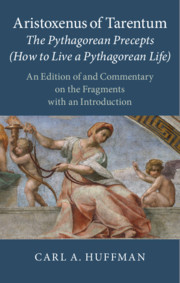
-
Select format
-
- Publisher:
- Cambridge University Press
- Publication date:
- 31 October 2019
- 31 October 2019
- ISBN:
- 9781108593168
- 9781108425315
- Dimensions:
- (216 x 138 mm)
- Weight & Pages:
- 0.9kg, 646 Pages
- Dimensions:
- Weight & Pages:
You may already have access via personal or institutional login
Book description
The Pythagorean Precepts by Aristotle's pupil, Aristoxenus of Tarentum, present the principles of the Pythagorean way of life that Plato praised in the Republic. They are our best guide to what it meant to be a Pythagorean in the time of Plato and Aristotle. The Precepts have been neglected in modern scholarship and this is the first full edition and translation of and commentary on all the surviving fragments. The introduction provides an accessible overview of the ethical system of the Precepts and their place not only in the Pythagorean tradition but also in the history of Greek ethics as a whole. The Pythagoreans thought that human beings were by nature insolent and excessive and that they could only be saved from themselves if they followed a strictly structured way of life. The Precepts govern every aspect of life, such as procreation, abortion, child rearing, friendship, religion, desire and even diet.
Reviews
‘… this publication is therefore certainly a exegetical monument essential to all those who are interested in ancient or Aristoxenian Pythagoreanism.’
Laurent Claive Source: Resenas Reviews
Contents
Metrics
Altmetric attention score
Full text views
Full text views help Loading metrics...
Loading metrics...
* Views captured on Cambridge Core between #date#. This data will be updated every 24 hours.
Usage data cannot currently be displayed.
Accessibility standard: Unknown
Why this information is here
This section outlines the accessibility features of this content - including support for screen readers, full keyboard navigation and high-contrast display options. This may not be relevant for you.
Accessibility Information
Accessibility compliance for the PDF of this book is currently unknown and may be updated in the future.


